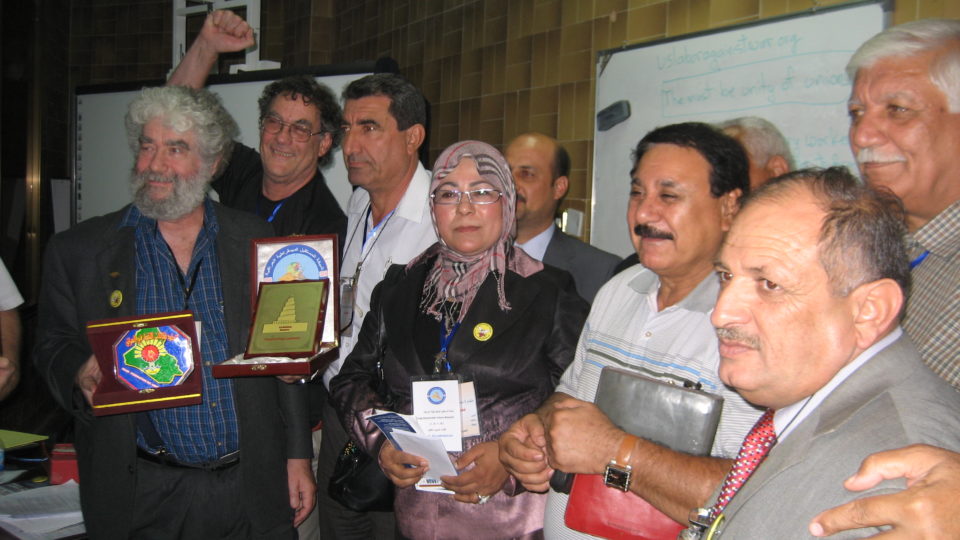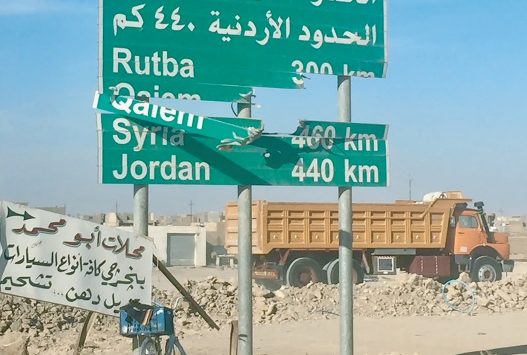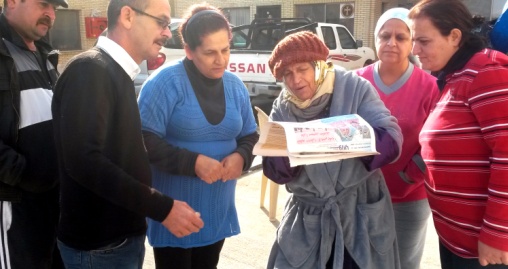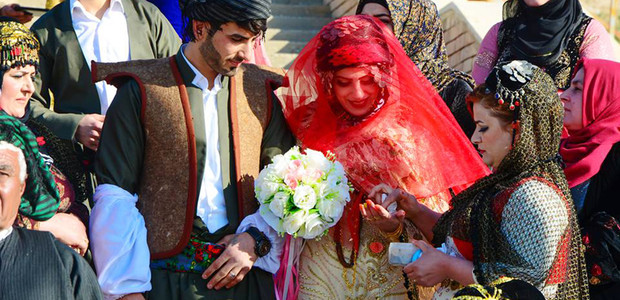American, Iraqi labor leaders sign to dissolve Saddam’s labor laws
American, Iraqi labor leaders sign to dissolve Saddam’s labor laws http://www.todayszaman.com/news-296152-american-iraqi-labor-leaders-sign-to-dissolve-saddams-labor-laws.html#.UIfPmE3lLU4.facebook 23 October 2012 / ALYSON NEEL, BASRA The Second Iraqi Nonviolence Forum wrapped up on Monday in Basra with an important, concrete step towards a more democratic future for Iraqi workers — a joint statement and action plan to support the passage of a free labor law. [Joint declaration follows article.] Michael Zweig and Gene Bruskin from US Labor Against the War (USLAW) and seven Iraqi trade union leaders agreed on Sunday to make a concerted effort in advocating abroad and pressuring the Iraqi Parliament to pass the recently submitted labor draft law granting full labor rights to all workers and unions.
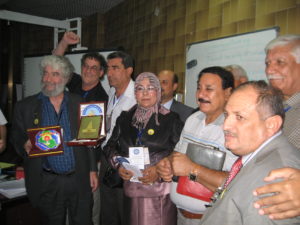
The inclusion and discussion of labor rights at the Second Iraqi Nonviolence Forum is a continuation of nine years of common work and support between the American and Iraqi labor movements. Since its establishment in 2003, Bruskin said USLAW has worked not only internally, in opposition to militarization in US foreign policy, but also externally, in solidarity with the Iraqi labor movement. In October 2003, a delegation from USLAW visited Iraq and met with the Labor Ministry and senior labor leaders to get a better feel for the status of labor rights. With Saddam Hussein’s 1987 decree forbidding unions in the public sector — most of the country’s economy — the situation was not good. Despite the toppling of the dictatorial regime and the repudiation of many of its laws, the Hussein-era labor law remains on the books today. “From 2003 to the present, we’ve been in regular contact with the Iraqi labor movement, sent money [via the Iraq Labor Solidarity Fund] and helped facilitate statements against repression they face,” Bruskin told Today’s Zaman. Back home, USLAW has used its labor network to address and apply pressure on both the Iraqi and American governments to support labor rights in Iraq. The heads of Iraqi unions and union federations, many of whom deliberated over the joint statement on Monday, also paid visits to the US in 2005, 2007 and 2009. The 27-minute documentary “Meeting Face to Face,” sponsored by USLAW, is based on the 2005 tour of six senior Iraqi labor leaders through 25 US cities, addressing union audiences, university forums and community gatherings. “The tour was very powerful and influential because it brought face-to-face Iraqi workers as human beings to Americans,” said Zweig, a professor at Stony Brook University, where he is also the director of the Center for the Study of the Working Class. “The message they brought was very much ours — to stop war, stop privatization of Iraqi oil and have a democratic labor law to allow free trade unions. And these were issues we in the United States were dealing with too.” “To make progress on these issues, everyone [in Sunday’s workshop] agreed a strong and unified Iraqi labor movement is essential,” Zweig continued. The next step in bolstering Iraq’s labor movement, according to the international and Iraqi labor movement representatives at the workshop, and the most pressing need of the country’s workers is a new labor law overturning Hussein’s oppressive legal framework and guaranteeing workers and unions full labor rights as defined by international standards. Despite the nine years of cooperation with the US labor movement, Zweig said Iraqi participants were at first skeptical that anything more than flowery statements of support could result from the workshop. While everyone eventually agreed a joint declaration to support the Iraqi draft labor law was a good idea, no one had yet made a move to do something when Zweig suggested it. “We have a saying in the US,” he said. “Put it in writing, or it means nothing.” Zweig and Bruskin then refused to end the workshop before they all buckled down to draft and sign a joint statement everyone already had supported nominally. After about one hour of huddling and revising, two declarations, one in Arabic and the other in English, had been signed by all the major trade union representatives, including the Kurdish federation, with Zweig and Bruskin as witnesses.“We, the undersigned union and union federation leaders, in the presence of delegates from US Labor Against the War, agree that we accept the draft new labor law that was presented to the Labor Committee of the Iraqi Parliament on Sept. 12, 2012, with the agreed 90 points of modification, consistent with ILO [International Labor Organization] standards,” the declaration, originally scribbled on a yellow steno pad, begins. According to the agreement, the Iraqi signatories will work in unity to pressure the Iraqi Parliament to pass this labor law and will form, by no later than Dec. 1, one central union commission. The senior Iraqi labor representatives also called on the international labor movement to organize support for the passage of the Iraqi labor law. “We were surprised too,” Zweig said of the joint agreement. “We didn’t think this would be an outcome of the workshop. It just sort of happened organically.” Zweig presented the joint declaration on Monday to the international delegation of the Second Iraqi Nonviolence Forum’s closing ceremony. Once returning Stateside, Zweig said the USLAW delegation would continue its work of solidarity with the Iraqi labor movement, and collaborate with its colleagues in France, Italy and Spain to do the same in their countries. The first step USLAW will take will be to provide links to both the Arabic and English versions of the joint declaration, along with information on how to get involved in supporting the labor law’s passage, on its website: www.uslaboragainstwar.org. “When we go back with these documents, the film and interviews, we will be the only source in the US for direct information about what is happening with working people in Iraq,” Zweig said. “We are it as far as doing this sort of work.”

